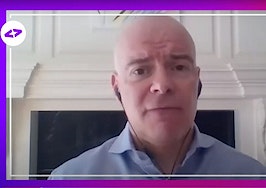Keller Williams CEO and co-founder Gary Keller has been through some tough times in his roughly four decades in the real estate industry.
But at the company’s yearly Mega Camp event, which was being broadcast virtually from Austin, Texas, Keller admitted, the current pandemic, economic climate, natural disasters plaguing the country, and civil unrest, means, “this may be the toughest of them all.”
Keller, speaking alongside Jay Papasan, the international real estate franchisor’s vice president of learning, forecasted more tough times ahead, followed by a slow recovery.
“We’re gonna have a year or two of tough, and then we’re going to slowly start to climb out,” Keller said. “That’s what I believe.”
“The pandemic is a very unique situation, and timing on its resolution is uncertain.”
The real estate industry is currently undergoing at K-shaped recovery. Essentially, two distinct groups are having two distinct experiences, which is why the economic uncertainty and high unemployment numbers are yet to be reflected in a housing market that outpaced the year prior in home sales, last month.
The pandemic has affected different age groups and different earners in varying ways, according to Keller. Those who work in fields that make the least — and are typically renters — face higher unemployment.
Unemployment in the leisure and hospitality sector of the economy was at 21.3 percent unemployment in August, while the financial activities sector was at 4.2 percent, which is near full employment, according to Keller.
“The reason why the real estate industry has so far not been incredibly affected is: because the men and women that make the most amount of money are the ones least suffering financially,” Keller explained. “If something doesn’t occur to help the men and women [who make the least], their lack of employment begins to affect the [men and women who make the most].”
There’s a major divergence among age groups as well. The unemployment rate for individuals under 24 was 14.1 percent in August, but that group only accounts for 3 percent of homebuyers.
The unemployment rate for individuals between 24 and 35 — typically the age of a first-time homebuyer — was 9.7 percent. That group accounted for 25 percent of homebuyers in August.
Meanwhile, the unemployment rate for individuals older than 35 — which accounted for the other 72 percent of home purchases — was 6.8 percent.
“The people that make the most amount of money and make the most disposable income and the men and women who make the overwhelming majority of buying homes, the 35-and-up crowd, are the least affected by unemployment,” Keller said. “Their incomes have been affected the absolute least and their employment has been impacted the least of the major age groups.”
“That’s why housing has seen a rebound at this point,” Keller added.
But Keller sees things more as a series of dominoes, where the high unemployment rate among lower earners will eventually impact higher earners and thus, eventually impact the housing market.
What’s next for the housing market is coming in two stages, Keller believes. First, the owner-occupied housing market will continue to see strong demand, with low-interest rates and incomes for earners in the typical homebuying range, remaining stable. Sales may be somewhat limited by low inventory.
The investment market could see some stumbling blocks in the first stage, with renters beginning to struggle, leading to missed rent as a result of high unemployment in the service and retail sector. That could push rents down and slow cash flow to investors, leading to investment properties being sold and becoming owned-occupied properties.
Eventually, the high unemployment rate among low earners will lead to less consumer spending and industries doing better than average will start to hurt as well.
The second stage of what’s next will be demand for homes slowing when demographic groups of typical homeowners begin to be negatively affected. Prices could continue to increase as a result of both low inventory and low mortgage rates. Demand will recover as unemployment recovers, according to Keller.
There’s a major potential pitfall lurking in the market, which is the potential for a high number of forbearances, according to Keller. If we get to the second quarter of 2021 and the number of loans in forbearance remains high, we could see homes begin moving onto the market and foreclosures increase.
But on the brighter side, there are a few things that Keller believes could make a difference and lead to much more expeditious recovery. A vaccine sooner than expected changes the timing of everything, but even absent a vaccine, in-home rapid testing and widespread contact tracing could bring things closer to normal.
In every recession, there’s a moment when a true transfer of wealth occurs, according to Keller. He believes it’s most likely to happen again this time around.
“If you can put yourself in a position to survive — even if you go backward but you’re making all the right moves financially and professionally and getting ready — you can position yourself so that, as we come out, you are first in line, you are off the starting block faster than anybody else and you will reap tremendous personal and professional reward,” Keller said.
The nearly hour-long discussion of the housing market was data-heavy, but near the midway point, Keller paused for a quick aside to remind the tens of thousands of agents watching the live stream that these are people’s lives. And despite speaking in clinical, data-heavy terms that many people are facing great personal pain right now.
“I don’t want our statistical or analytical conversation in any way to demean or dismiss the tragedy that’s occurring in real life that we’re talking about in clinical terms,” Keller said.










